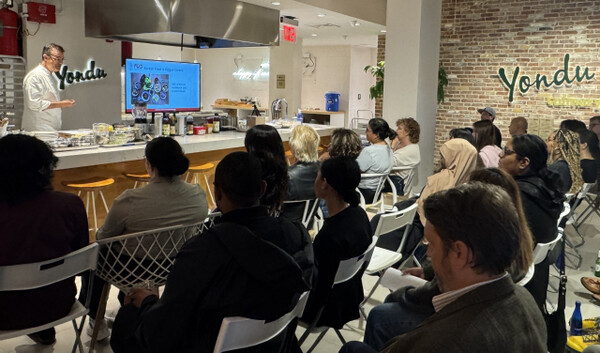Chefs Impressed by Plant-based Umami, Explore New Recipe Possibilities

Sempio Foods Co. announced on Sept. 30 that it held workshop on "jang," traditional fermented sauces and pastes that are foundational to Korean cuisine, for chefs from the American Culinary Federation (ACF), North America’s largest culinary professional association, at the Yondu Culinary Studio in New York, USA, on Sept. 25 (local time).
The "JANG: The Foundation of Korean Flavor Workshop" was organized at the request of ACF-affiliated chefs to directly experience the taste of Korean jang and share recipes and ideas that can be applied to local cuisine. The ACF, established in 1929, is North America’s largest culinary professional organization, with over 14,000 chefs active across the United States.
The workshop, attended by about 40 chefs, received a great response by sharing practical recipes and ideas that could be immediately utilized in local restaurants. Chef Jaume Biarnés, the head chef of Yondu Culinary Studio who led the workshop, is an expert who has long studied Korean jang scientifically from a foreigner’s perspective and applied it to cooking. Before joining Sempio, he worked as a head chef at the Spanish culinary science institute Alícia and participated in developing the "Jang Concept Map" and over 150 jang recipes. Sempio opened the Yondu Culinary Studio in New York in 2018 and has been conducting various classes and seminars with Chef Jaume to promote the value of Korean jang to the world.
Chef Jaume had participants taste water with a drop or two of the global jang Yondu. Chefs who had preconceptions that Korean jang would be “salty and intense” were reportedly unable to hide their surprise at the clean yet deep umami taste felt in the diluted Yondu water. Chef Jaume explained, “The deep flavor as if meat was added is the umami of fermented soybeans,” adding, “Yondu is purely plant-based and rich in the natural umami of fermented soybeans, allowing for delicious dishes to be completed without additional ingredients such as spices, oil, butter, or salt.” He demonstrated a potato soup that reduced sodium content by using Yondu instead of salt while enhancing flavor, and presented pasta that used Yondu for umami instead of cheese, providing new inspiration to chefs considering vegan recipes.
Sempio’s Organic Gochujang, with its deep umami from fermented soybeans making it deliciously spicy, also attracted great interest from local chefs. The organic gochujang, which adjusts the saltiness and spiciness of traditional Korean gochujang to suit global tastes, received positive reactions for being gluten-free, vegan, and non-GMO. Chef Jaume showcased a gochujang glaze recipe by adding Yondu and honey to the organic gochujang, also presenting ideas for using it in various dishes such as chicken wings and salmon.
Participants unanimously stated, “We learned that the unique deep flavor of Korean cuisine comes from fermented soybean jang,” or “It was greatly inspiring to know that we can enhance the flavor of dishes healthily and sustainably using Korean jang without significantly changing familiar ingredients and recipes.”
A Sempio representative said, “It was a meaningful workshop where we worked with local chefs who are trying to incorporate the secret of Korean flavors into their own cooking, beyond simply tasting and replicating Korean cuisine,” adding, “We will strive to make K-sauce the center of world gastronomy by realizing our vision of ‘Delighting the World with Our Flavors’ through planning classes and workshops utilizing various Korean jang including Yondu.”


